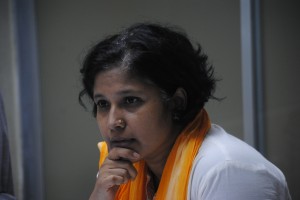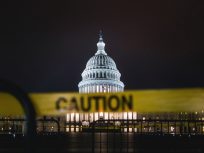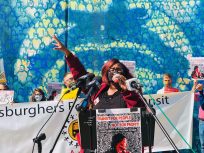February 21, 2015 marks the 50th anniversary of Malcolm X’s death. More accurately, it marks 50 years since his assassination at the Audubon Ballroom during his speech at the Organization for Afro-American Unity (OAAU), a Pan-Africanist organization he founded. It is also coincidentally the same day of the Language Movement in Bangladesh, where Bangladeshis fought against the imposition of Urdu as a national language by Pakistan. The convergence of these historical facts as a first-generation Bangladeshi based in the United States reveals to me some helpful lessons in understanding the nuances of social justice movements and their relationship to faith, and their dynamism and conflicting and mutually constitutive functions. Malcolm X emerges as an essential philosophical and political figure to help us navigate our contemporary politics, especially in the post 9-11 era. I suggest understanding his legacy not as some rote ritualistic historical exercise for Black History Month, but to provide some clarity on the path forward in racial justice struggles, democracy movements, and to break out of this Islam vs. West binary. His global legacy provides some insight in this War of Terror era.
Relevance of Malcolm X to Bangladesh
Malcolm’s life seems instructive for Bangladeshis today in its current political crisis, and for Muslims globally. Given his experience as a black man in the United States, and his acceptance of Islam as his faith, he managed to construct his identity both racially, and also as a Muslim. These identities emerged, and were a specific response to the oppression of blacks in the U.S. However, these identities were not imagined as fixed, static, but through these identities he constantly challenged notions of blackness, critiqued integrationist strategies for civil rights, and at the same time, became critical of the exclusionary view of the Nation of Islam (NOI), pushing his own thinking on Muslim identity. He did not seek to “moderate” or “reform Islam” because he saw himself as both Black and Muslim. In this context, it is important to review the Muslim Anti-Racism Collaborative celebration of his legacy on #BeingBlackAndMuslim. On Islam today, and the global ummah, we can only speculate how he would have positioned himself on Al Qaeda and ISIS, and since we could not explore his theological journey from NOI to post Hajj, when he returned and opted to be known as El Hajj Malik El Shabazz since soon after he was assassinated. Perhaps, his statements in his interviews that he was dejected and did not leave the Black Muslim movement suggest that he would have engaged in a critique from within by engaging in the global Muslim community. He had already begun to do so by visiting the Middle East and other Muslim countries.
From Bangladesh’s Language Movement, which is said to be the precursor movement to the 1971 Nationalist Liberation Movement, Bangladesh still struggles internally with its nationalist and faith identities. While the liberation struggle was about the political and economic subjugation of Bangladeshis by Pakistani ruling elites, the expression of that underlying socio-economic struggle manifested itself in a cultural movement. One remembering of that struggle was essentially a triumph of secularism over Islam. Jamaat’s, as an Islamic political party, lack of support of Bangladesh’s independence further cemented that view. However, the liberation struggle was not a rejection of Islam, so much as it was a rejection of a narrow Islamic political identity coupled with the struggle against the ruling class in West Pakistan. Here, there are echoes of Malcolm’s critique of NOI. Malcolm’s life suggest that as Bangladeshi we can be #BengaliAndMuslim
While it is beyond the scope of this essay on Malcolm X to discuss specifically the politics of Bangladesh, it is safe to say that we are now witnessing a supposed schism between secularism and Islam similar to that on the global political stage. That schism is further exacerbated and polarized after 9-11, and the aggressive global war on terror. Bangladesh has incorporated anti-terrorism laws imported from US and use the rhetoric of terrorism to suppress political dissent. That Malcolm under threats of the state and under surveillance, both affirmed his faith and his identity as a black man as a mode by which to resist oppression, is helpful for all in understanding how we might navigate the present political terrain.
Navigating Multiple Identities While Building a Beloved Community
Outside of the U.S., Malcolm’s navigation of his faith and racial identity, not at the exclusion of the other, reveals how a politics can emerge from localized experiences and connected to a global faith. What results is a more diverse portrayal of a faith, that is not only responsive to local struggles that develops an identify based on particularized resistance, but also finds common ground to unite globally. This is disruptive to a continual portrayal of Islam in opposition to secularism, portraying one vision of a Muslim and debating an “authentic” or real Islam.
In his later life, Malcolm sought to build this global ummah through his travels to the Middle East. His vision included his Asian and African brothers and sisters, not only Muslims. OAAU was formed as a non-faith based organization. In 1964, he became disillusioned with NOI and terminated his relationship in 1964. While such termination was characterized as personal, one in terms of NOI leader, Elijah Muhammad, it was also a rethinking of the Muslim role in mainstream social movement work. By then, Malcolm was more open to partnering with mainstream civil rights organizations, but remained rooted in his identity and experience as a Black Muslim. This is key because he saw his identity as a Muslim central to social transformation, but did not see it as excluding him from participation with civil rights leaders, like King. It was also during this time, that he was thought to be most threatening.
Challenging the Status Quo in the Face of Prejudice
Malcolm’s speeches and life’s work is prescient in understanding our current political climate after 9-11 which was marked as an aggressive global campaign called the War on Terror. Post 9-11, with the War on Terror, Muslim identities have been polarized to secularism and Islamists. Bush’s statement, “you are with us or against us”, reflects this divide. Zakia Afrin in Legalizing Discrimination: Rising Tide of Islamophobia writes on the history of rising Islamophobia in the U.S., and the laws that helped to facilitate its rise.
Powerfully, his analysis of violence is instructive to us now as yet again Muslims are painted as promoting violence. Today, we may find Malcolm in solitary confinement in the Communications Management Unit, or languishing in Guantanamo. In his lifetime, he was surveilled by the FBI, and the local police. Today, he would continue to be surveilled under the NYPD’s recently disbanded Demographics Unit.
To be Muslim, a social justice aspirant, a community builder, and/or human rights loving is challenging. Malcolm shows us a different way to engage with these mutually constitutive identities towards an understanding of justice that springs forth from the experiences of oppressed peoples. However, he clearly positioned his resistance within his own personal and historical experiences of oppression.
DC based activist Saurav Sarkar writes: “There are few symbols of radical, iconoclastic ideological anger and righteousness as pure as Malcolm X. And at the same time, the fact that he is first fallen and then finds Allah was really important to me as a point of hope.”
Malcolm through his life experiences speaks specifically to the experiences of the poor and working class: to those who as Saurav says: ”fallen” or marginalized. To locate his identity from the dispossessed serves as bulwark against more elitist, exclusionary, racialized, and hegemonic formations of Muslim identities around the globe. I have found those formations to be most destructive and the ones we should be critiquing as activists, just as Malcolm did within the context of his relationship with the NOI.
Human Rights Discourse Rooted in the Experience of Oppressed Peoples
It was through constant negotiation, critique of his racial and Muslim identity that he arrived at an internationalist and human rights position. In other words, he neither had to leave his blackness, nor his Muslim identity to understand the importance of a broad based international movement. As a result, he also refused to be marginalized in the dominant construction of either of these identities.
This is the problem with human rights struggles that ignore the subjectivity of oppressed peoples. It necessitates that they leave their particular historical experiences and cultural identity in order to be more inclusive and therefore not claim that identity. This position requires oppressed peoples to assimilate to status quo rather than challenge it. Malcolm shows us that you can be a Muslim, and at the same time be an internationalist. He brought the local experiences of African-Americans into the international forum. Miami-based human rights activist Muhammed Malik points out: “his insistence on injecting civil rights struggle into the larger international web of human rights was pivotal.”
In response to calls for responses by activists on Malcolm’s legacy, Tazneen Doha, UC Davis graduate student who works on Islam, critical race theory, Islamic Studies, and colonialism writes: “The very concept of the ‘human’ in Malcolm’s articulation of ‘human rights’ is different from what we generally consider to be the human rights discourse in liberalism. Malcolm’s articulation of the ‘human’- as subjects created by Allah with specific attributes and “God-given” rights – is in many ways in a fundamental antagonism with the notion of the individual and his rights emerging out of a specific crisis in European discourse, which was globalized through colonialism.”
In this regard, Malcolm sought to displace the production and dissemination of a human rights discourse originating out of post-Cold War Europe, and to imagine a discourse rooted in the experiences of oppressed communities. It is for this reason his legacy reverberates powerfully across the globe, and even to a place like Bangladesh. Bangladeshis struggle deeply, and now violently, to understand its cultural, political and religious identity, more so under an aggressive global War of Terror. Malcolm’s life reminds us that while one’s struggle manifests in one identity, here Language Movement, and for Malcolm, race, they are all an expression of a human rights struggle for justice. This common yearning for justice springing forth from our history of oppression and resistance is what will unite us globally.
Laying the Foundation for Long-term Transformative Change
In addition to a radical politics that can be learned from his life, Malcolm’s legacy is instructive as an organizer and institution builder. He built up the Nation of Islam, understanding the importance of creating new structures to replace oppressive ones. Malcolm understood the importance of mobilizing, organizing, and also channeling people’s power into institutions. While at the Nation of Islam, he helped membership grow from 500 in 1952 to 30,000 in 1963, according to figures provided on the website MalcolmX.com. He developed Muhammad Speaks the widest read newspaper produced by an African-American organization which understood the importance of independent media for social justice struggles.
Do We Really Know Malcolm?
Even as I try to understand his legacy through my own experiences, many remark, “The cynic in me wonders – do we really know Malcolm?” I, too, wonder. Sharai Erima, a lawyer who advises activist groups, said: “I often cringe when people take figures like Malcolm X and hoist him from the pages of history and drop him into the present to ask, “how would he fare in today’s world? Malcolm X would be a different person if he lived in a different time. Which Malcolm are you talking about? As his evolution has three (some argue four if you include his pre-crime years) distinct phases. You can’t view his legacy al-la-carte.”
But, do we need to “know him” in this factual, biographical, descriptive sense. Or is it sufficient that we each experience his legacy, based on what is known, and determine what resonates with our current, specific struggle for human rights. Ideas are powerful when they are constantly engaged, employed in an interpretative process based on peoples’ lived experiences.
We can try to understand Malcolm as a person, archiving his speeches, talking to those who knew him, but might we know him as an embodiment, incarnate of the dialectical and interpretative process by which social change and movement building work occurs. In that way, we know him in relational terms, based in a loving relationship to our own respective struggles, not in some effort to idolize him externally to our on-going grassroots organizing work. That he, too, changed, evolved, and reconstituted himself, as anyone would who struggles for autonomy and liberation, so too does our relationship with his legacy. In our process of knowing him, we also change. That is the power and moving force of his legacy. 50 years later he moves us to act in the present.





